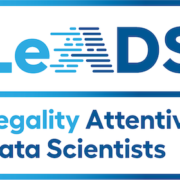The beginning of the LeADS era
On January 1st 2021 LeADS (Legality Attentive Data Scientists) started its journey. A Consortium of 7 prominent European universities and research centres along with 6 important industrial partners and 2 Supervisory Authorities is exploring ways to create a new generation of LEgality Attentive Data Scientists while investigating the interplay between and across many sciences.
LeADS envisages a research and training programme that will blend ground-breaking applied research and pragmatic problem-solving from the involved industries, regulators, and policy makers. The skills produced by LeADS and tested by the ESR will be able to tackle the confusion created by the blurred borders between personal and commercial information and between personality and property rights typical of the big data environment. Both processes constitute a silent revolution—developed by new digital business models, industrial standards, and customs—that is already embedded in soft law instruments (such as stakeholders’ agreements) and emerging in case law and legislation (Regulation EU 2016/679 and the e-privacy directive to begin with), while data scientists are mostly unaware of them. They cut across the emergence of the Digital Transformation, and call for a more comprehensive and innovative regulatory framework. Against this background, LeADS is animated by the idea that in the digital economy data protection holds the keys for both protecting fundamental rights and fostering the kind of competition that will sustain the growth and “completion” of the “Digital Single Market” and the competitive ability of European businesses outside the EU. Under LeADS, the General Data Protection Regulation (GDPR) and other EU rules will dictate the transnational standard for the global data economy while training researchers able to drive the process and set an example
The data economy or better way the data society we increasingly live is our explorative target under many angles (from the technological to the legal and ethics one). This new generation is needed to better answer to the challenges of the data economy and the unfolding of the digital transformation scoping. Our Early Stage Researchers (ESRs) will come from many experiences and backgrounds (law, computer science, economics, statistics, management, engineering, policy studies, and mathematics,..).
ESRs will find an enthusiastic transnational, interdisciplinary team of teams tackling the relevant issues from their many angles. Their research will be supported by these research teams in setting the theoretical framework and the practical implementation template of a common language.
LeADS research plan, although already envisages 15 specific topics to be interdisciplinary investigated, remain open-ended.
It is natural in the fields we have selected for which we identified crossover concepts in need of a common understanding of concepts useful for future researchers, policy makers, software developers, lawyers and market actors.
LeADS research strives to create, share cross disciplinary languages and integrate the respective background domain knowledge of its participants in one shared idiolect that it wants to share with a wider audience.
It is LeADS understanding that regulatory issues in data science and AI development and deployment are often perceived (and sometimes are) hurdles to innovation, markets and above all research. Our unwritten goal is to contribute to turn regulatory and ethical constraints which are needed in opportunities for better developments.
LADS aims at nurturing a data science capable of maintaining its innovative solutions within the borders of law – by design and by default – and of helping expand the legal frontiers in line with innovation needs, preventing the enactments of legal rules technologically unattainable.
By Giovanni Comandé



